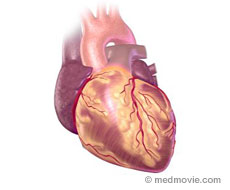![]() Click the “Show Me” Icon to view ASE’s Library of Heart Ultrasound animations.
Click the “Show Me” Icon to view ASE’s Library of Heart Ultrasound animations.
Heart Ultrasound can be very helpful to:
- Evaluate a heart murmur

- Diagnose and determine the extent of valve conditions
- Determine the presence of abnormalities in the structure of the heart
- Measure the size and thickness of the heart and its chambers
- Assess the motion of the chamber walls and the extent of damage to the heart muscle after a heart attack
- Assess how different parts of the heart are functioning in patients with chronic heart disease
- Determine if fluid is collecting around the heart (Congestive Heart Problems)
- Identify presence of tumors in the heart
- Assess for and monitor congenital defects
- Evaluate a patient’s response to a treatment or a corrective procedure
- Evaluate blood flow through the heart
- Assess the heart condition prior to transplant; see if major blood vessels have been damaged by traumatic injury
- Assess problems with the heart muscle (known as cardiomyopathy)
- Assess abnormal heart rhythms (arrythmias)
- Assess Bacterial Endocarditis (BE—an infection of the valves and inner lining of the heart. This happens when bacteria from the skin, mouth or intestines enter the bloodstream and infect the heart.
- Assess EF –ejection fraction levels (heart flow)
- Rule out any of the above mentioned abnormalities
Why is Cardiac Ultrasound the most popular type of heart evaluation?
The echocardiogram has been the most widely-used diagnostic test for heart disease for over 50 years!
- A sedative is not needed for an echo.
- Injection of a dye is not involved in a regular echo. This can be used to enhance an echo (contrast echo), but is not necessary for all echocardiograms.
- You aren’t put in a claustrophobia-inducing machine to do the procedure. Echo is conducted as you lie on a comfortable table.
- Echo scanning equipment is readily available in almost all hospitals and clinics. Other new technology may not be available in every healthcare setting.
- Echo is not a high priced procedure (typically regular echos cost between $750-$1,500). Other technologies can be much more expensive than getting a conventional echo. In contrast, a visit to get your teeth professionally whitened at the dentist runs $700; and lasic surgery on your eyes can cost over $2,000.
- Echo is an accepted procedure for the diagnosis of heart health, a variety of heart diseases and ailments. The Echo can be used in all stages of life.
- The echo does not involve any radiation exposure.
Why Should You Be Concerned?
- Every year, about 1.2 million Americans will have a coronary attack. About 494,000 will die and many could be avoided.
- Cardiovascular diseases, including CHD and stroke, remain the number one cause of death in the United States, killing more than 953,000 Americans each year.
- Stroke is the 3rd leading cause of death in the US and a leading cause of death worldwide.
- Cardiovascular disease claims more women’s lives than the next six causes of death combined — about 500,000 women’s lives a year.
- Worldwide, about 1 in 150 babies are born with cardiac defects.
Millions Served!
That’s right, just like McDonalds. In over 50 years of treatment, millions of people have safely experienced cardiac ultrasound and it has saved many, many lives.
Why Are You Waiting?
Echocardiograms aren’t for everyone, but if you would like to protect your heart health because of a family history of heart disease, are in a high-risk group, or are experiencing any symptoms (shortness of breath, pain in your arm, etc.—see AHA guidelines), take the time out to talk to your doctor today. Your heart health depends on YOU!
The Connection Between Heart Valve Disease & Echocardiograms One Pager Resource
To support Heart Valve Disease Awareness Day on February 22, ASE partnered with Heart Valve Voice U.S. to create a one pager resource, “The Connection Between Heart Valve Disease & Echocardiograms,” to help patients interpret their echocardiogram results. View it here.
Last Update 5/27/2011








